What is liver cirrhosis? Causes, symptoms, diet and key prevention tips you shouldn't ignore | - Times of India
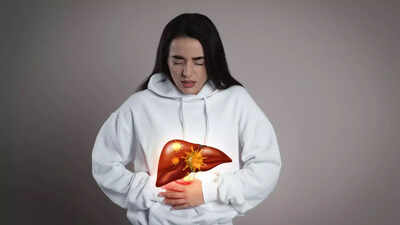
Cirrhosis of the liver is a chronic and progressive disease in which healthy liver cells are slowly replaced by scar tissue, impairing vital liver functions such as detoxification and nutrient processing.
Common causes include chronic alcohol use, hepatitis B and C infections, and non-alcoholic fatty liver disease. Often silent in its early stages, cirrhosis can lead to severe complications like liver failure if untreated. This detailed guide examines its causes, symptoms, stages, and available diagnostic and treatment options, while highlighting the importance of early detection and lifestyle changes in managing the condition and preventing irreversible damage.
Cirrhosis occurs when chronic liver damage leads to persistent inflammation and scarring (fibrosis). As the liver attempts to heal itself, it forms scar tissue in place of healthy cells. Over time, this tissue stiffens the liver, disrupting essential functions such as:
7 Ways to check for fatty liver at home
As scarring increases, the liver loses its ability to regenerate, eventually resulting in end-stage liver disease or liver failure.
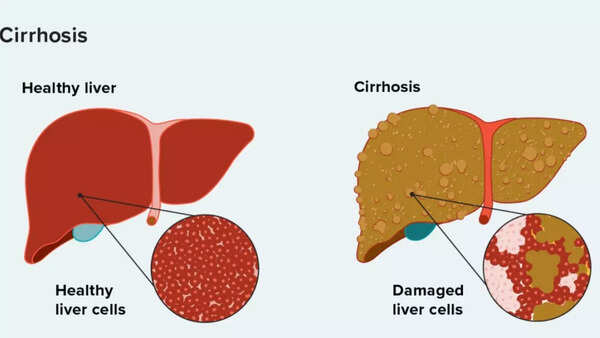
Source: Cleveland Clinic
Symptoms vary depending on the stage and cause of the disease.
Early warning signs may be vague, but they worsen as the condition progresses.Early symptoms:
Advanced symptoms
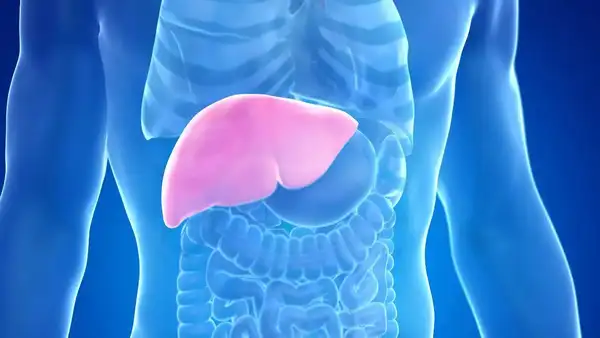
According to the Cleveland Clinic, cirrhosis is the final outcome of long-term liver inflammation. Some of the most common causes include:
Chronic alcohol inflames and scars the liver. Repeated exposure over time leads to alcoholic hepatitis and eventually cirrhosis.
Linked to obesity, high cholesterol, and diabetes, NAFLD causes fat accumulation in liver cells, triggering inflammation.
Both viral infections attack liver cells, leading to long-term damage and fibrosis. Hepatitis C, in particular, is often asymptomatic for years.
Autoimmune hepatitis, Wilson disease, and hemochromatosis can also lead to cirrhosis by triggering ongoing liver inflammation.
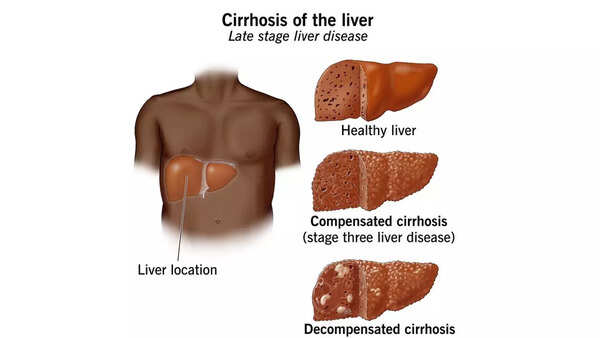
Source: Healthline
Cirrhosis develops in two major stages, depending on how much damage the liver has sustained.
In this early stage, the liver is damaged but still performs its essential functions.
Many patients experience no obvious symptoms, and cirrhosis may go undetected unless discovered through blood tests or imaging.
As scarring worsens, the liver can no longer function adequately. Decompensated cirrhosis is marked by severe symptoms such as jaundice, fluid retention, bleeding, and mental confusion. This stage is often life-threatening and may require a liver transplant.
As per reports, early diagnosis is crucial to managing and slowing the disease. Doctors may use:
Cirrhosis is not reversible, but with proper care, its progression can be slowed or even halted.
Treatment focuses on managing the cause, improving quality of life, and preventing complications.As cirrhosis progresses, it may lead to severe and even fatal complications:
Include lean meats, fish, eggs, legumes, nuts, and dairy to help maintain muscle mass and avoid malnutrition.
A combination supports balanced nutrition and promotes better liver function.
Alcohol can accelerate liver scarring and worsen the condition.
These can increase liver inflammation and contribute to further damage.
Too much salt can cause fluid retention and swelling (ascites).
Cirrhosis weakens the immune system, increasing the risk of foodborne illness.
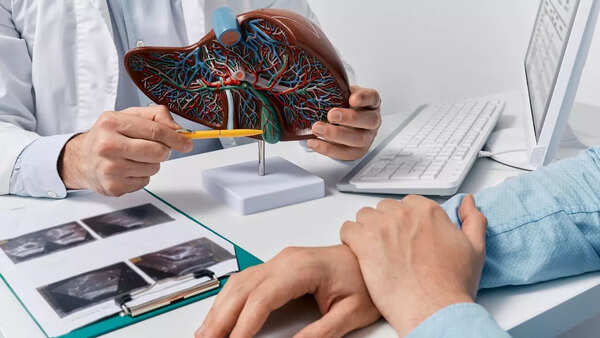
While cirrhosis cannot be reversed, a liver-supportive diet can slow disease progression, ease symptoms, and improve quality of life. Getting enough calories, protein, and essential nutrients like zinc, vitamin D, and B vitamins is key.
However, dietary changes can feel restrictive, especially when avoiding favorite foods like fast food or alcohol. Support from a doctor or dietitian is essential to personalize your plan and ensure you meet your nutritional needs.
In some cases, supplements or medications may also be recommended as part of your overall treatment.
Cirrhosis doesn’t usually develop overnight—it’s the result of chronic liver damage over many years.
While some causes, such as genetic disorders, cannot be avoided, many forms of cirrhosis are preventable through smart lifestyle and healthcare choices. Early intervention and proactive health monitoring can significantly reduce your risk.
Alcohol is one of the leading causes of liver cirrhosis, especially when consumed heavily and regularly over time. The liver is responsible for processing alcohol, and excessive use inflames and damages liver cells, leading to scarring.
Being overweight increases your risk of non-alcoholic fatty liver disease (NAFLD), a common condition that can progress to cirrhosis if left untreated. Obesity-related liver disease is now one of the fastest-rising causes of liver failure globally.What you can do: Eat a nutrient-rich, balanced diet and stay physically active. Losing even 5–10% of your body weight can reduce liver fat and inflammation significantly.
Hepatitis B is a viral infection that can become chronic and cause long-term liver inflammation and damage. It is a major cause of cirrhosis worldwide.
Metabolic conditions like type 2 diabetes, high cholesterol, and hypertension are linked to fatty liver disease and cirrhosis.What you can do: Regularly monitor your blood sugar and cholesterol levels. Follow your doctor’s advice on diet, exercise, and medication to keep these risk factors in check.
Many people with early-stage liver damage don’t experience symptoms. That’s why routine screenings can be life-saving, especially for people who have:
What you can do: Ask your healthcare provider for periodic liver function tests or imaging scans if you're in a high-risk category.
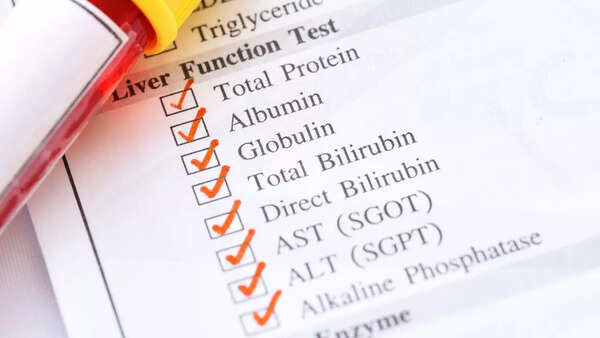
If you’ve been diagnosed with cirrhosis, there is still a lot you can do to slow its progression and maintain your quality of life. Medical supervision combined with healthy lifestyle habits can help you manage symptoms and avoid complications.
Even small amounts of alcohol can accelerate liver damage once cirrhosis is present.
Certain over-the-counter medications, especially acetaminophen (paracetamol) and NSAIDs (like ibuprofen), can also strain the liver. Always talk to your doctor before taking any new medication, supplement, or herbal remedy.
Medications may be prescribed to treat the underlying cause of liver damage (e.g., antivirals for hepatitis, diuretics for fluid retention, or lactulose for hepatic encephalopathy).Consistency is key—don’t skip doses and inform your doctor of any side effects.
Cirrhosis can cause sudden complications, so it’s important to stay vigilant. Contact your doctor if you notice:
- Sudden weight gain or loss
Regular follow-ups with a hepatologist or gastroenterologist are vital. Your doctor will monitor your liver function, check for complications like varices or liver cancer, and adjust your treatment as needed. You may need regular blood tests, ultrasounds, or endoscopies.*Disclaimer: This article is intended for general informational and educational purposes only. It is not a substitute for professional medical advice, diagnosis, or treatment. Always consult a qualified healthcare provider with any questions you may have regarding liver cirrhosis or any other medical condition.Also Read | Is back pain the next global health crisis? Here’s what’s causing it and 4 exercises you should start now







_1751880097.jpeg)




